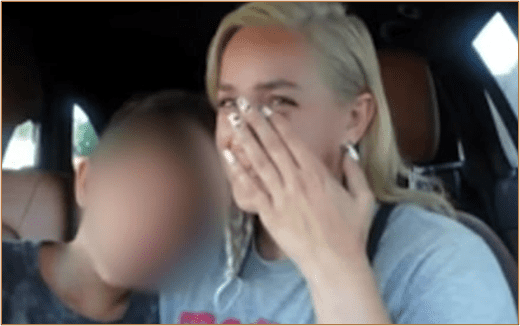
On September 8, 2021, Jordan Cheyenne, a family YouTuber with over 500,000 subscribers, posted a video on her channel titled “We are heartbroken.” In the video, she explained that her son’s new puppy had contracted Parvo, a highly contagious virus with a high mortality rate, and the family was terrified that the dog would not live for very long. While the video was relatively normal in the beginning, the end included a clip that Cheyenne seemed to forget to edit out, which shows her coaching her 9-year-old son on how to pose for a thumbnail image (the small image displayed on YouTube before you click on the video). “Act like you’re crying,” Cheyenne told him. Obviously upset, he responded with “Mom, I’m actually crying.” Viewers were outraged at Cheyenne’s behavior and the video quickly circulated on social media platforms. Soon the video, Cheyenne’s entire YouTube channel, and her Instagram account were all deleted. The situation has re-ignited a long-standing debate about the ethics of family vloggers.
On one hand, there are many criticisms of family YouTubers. Perhaps one of the most common critiques is that the parents (who run the vlogging channels) are profiting off their children. Some argue that the children in these families –sometimes called “kidfluencers”– should be held to the same standards as child actors and therefore be protected by child labor laws (H., 2020). These laws require that a certain percentage of the child’s earnings be put into a protected bank account; they also establish labor guidelines that include obtaining a permit for a child to work, limits on work hours, a mandate for “rest and recreation” time, and a requirement that the child’s work not interfere with their education (H., 2020). Because these guidelines do not apply to social media, they do not apply to children included in the videos posted on these family YouTube channels. Thus, these children are unprotected from the possibility of exploitation.
Another aspect of family channels brought up by critics is the topic of consent. Many channels post videos of parents having conversations with their children about private subjects. For example, a channel called 8 Passengers documented a conversation between a mother and her young daughter discussing puberty. Even if a child does consent to being on camera, how meaningful can it be coming from someone who does not fully understand the present or future implications of such an act while being encouraged (or pressured) by their parent? Furthermore, critics point out that many of these channels have dysfunctional families behind the scenes. For example, the ACE Family YouTube channel accidentally left a clip in a video posted in October of 2020 which shows the father, Austin McBroom, swearing at his wife in front of their children (Ward, 2020). Similarly, Myka Stauffer, a family YouTuber with over one million subscribers, posted a video in May 2020 explaining that she and her husband had to “re-home” their autistic 2-year-old son who they had recently adopted from China (Sisley, 2020).
On the other hand, fans of family YouTube channels claim that while there are some bad apples, the majority of these channels are harmless. Prank videos, arts and crafts, toy reviews, and daily vlogs are typically just surface-level entertainment that are fun for both the family and their subscribers (Ward, 2020). Importantly, family channels can also be a good resource for viewers that may be considering having children themselves. For first-time parents or first-time adopters, these vlogs offer useful advice from people who have clear experience in parenting and childcare.
Moreover, YouTube channels can also be a valuable source of income for families (Suha, 2020). As these vlogs have become more popular in recent years, in some cases raking in millions of views, they have allowed for the most popular channels to make a good profit from their content. In terms of a job, running a family channel isn’t a bad way to earn a living; you can set your own hours, include your family in your work, work from home, and you don’t have to answer to a boss (Suha, 2020). Indeed, household management and caring for children are expensive, so if parents are already having fun filming their families’ activities and memories, why not upload it for others to enjoy and earn some income at the same time?
Despite the potential advantages that family vlogs offer, critics maintain that these points only increase the stakes for potential harm. Indeed, the fact that many new parents may look to channels like Cheyenne’s and use them as a model for parenting is exactly why more and more people are coming out against family vlogs. However, for every problematic channel like Jordan Cheyenne’s, there are plenty of other truly wholesome accounts. Should these channels be punished for the actions of others? With the popularity of the genre growing so rapidly, and with other stories like Cheyenne’s continuing to surface, we will continue to be faced with important questions about our responsibility to children working on social media.
Discussion Questions:
- Should a government entity be in control of protecting children on family channels through legislation, or should that responsibility be left to YouTube or to parents?
- Do you think children have the ability to consent to being on camera and their image being published on the internet? At what age do you think that consent can be given?
- How are the ethical concerns of children on family YouTube channels different from kids posting content on their own social media channels?
- Should YouTube demonetize family YouTube channels altogether? If YouTube were to demonetize family vlogs, do you think the genre would still prosper?
- Is it ethical to watch family vlogs? What about vlogs that include questionable parenting? What are the ethical duties of the viewers of family vlogs?
Further Information:
Elfer, H. (2021, September 15). “YouTuber Deletes Channel After Being Caught Coaching Her Son to Cry on Camera Over Their Sick Dog.” The Independent. Available at: https://www.independent.co.uk/news/world/americas/youtube-jordan-cheyenne-coaching-son-b1920178.html
H., Carlota. (2020, June 12). “The Ethics of Family Vlogging.” Medium. Available at: https://medium.com/a-parent-is-born/the-ethics-of-family-vlogging-cd75b734f2f6
Sisley, G. (2020, May 29). “This YouTuber Rehomed Her Autistic, Adopted Son of 2 Years.” Medium. Available at: https://medium.com/fearless-she-wrote/this-youtuber-rehomed-her-autistic-adoptive-son-of-2-years-955abd4af5aa
Suha, S. A. (2020, February 5). “The Case of Family Vloggers.” The Daily Star. Available at: https://www.thedailystar.net/shout/news/the-case-family-vloggers-1864195
Ward, M. (2020, November 6). “Examining the Ethics of Family Vlogging.” The Journal. Available at: https://www.queensjournal.ca/story/2020-11-06/pop-culture/examining-the-ethics-of-family-vlogging/
Authors:
Claire Coburn, Jamie Jelinek, & Kat Williams
Media Ethics Initiative
Center for Media Engagement
University of Texas at Austin
February 1, 2022
YouTube screen capture from The Independent / Modified
This case was supported by funding from the John S. and James L. Knight Foundation. These cases can be used in unmodified PDF form in classroom or educational settings. For use in publications such as textbooks, readers, and other works, please contact the Center for Media Engagement.
Ethics Case Study © 2022 by Center for Media Engagement is licensed under CC BY-NC-SA 4.0




